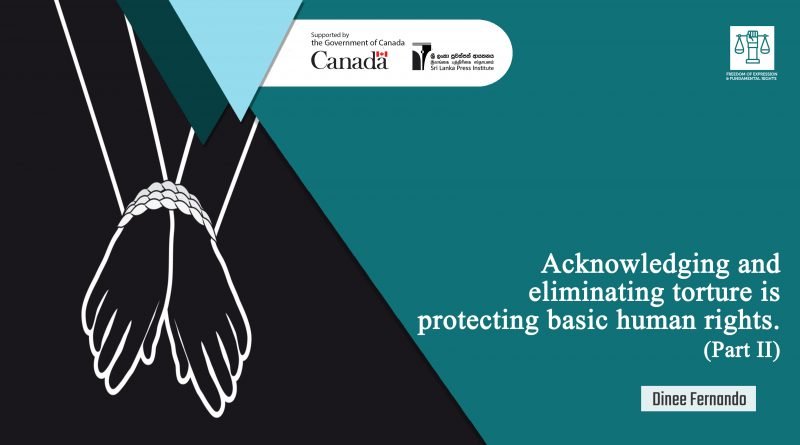
Acknowledging and eliminating torture is protecting basic human rights. (Part II)
Dinee Fernando
Under the Human Rights Commission Act, it has the power to investigate and prosecute a situation in which torture has occurred or is imminent. It has also made it possible for authorized officials to inspect police stations, prisons and other detention centres and to provide reports and necessary recommendations. These provisions seek to eliminate any torture and mistreatment of detainees.
Corporal punishment in schools and education institutes have been banned by the Education circular. Despite the existence of this legal framework, There were above 1000 complaints in 2017 against the Police alone.
Torture prevails in various forms and methods in Sri Lanka and it is vital to identify the most vulnerable people and places where it takes place the most in order to categorize it systematically. Here we can see that most cases of torture take place in the police and in prisons. There exists a vast number of finalized court cases regarding this issue and some of the most prominent cases include, Siripala A Wijesinghe vs. The Mathugama Sub police Inspector and Sriyani De Silva vs. The Iddamalgoda OIC. The case of Haritha Adikari is an example of torture away from the police station. Here the court issued the verdict considering both physical and mental torture.
It is known fact that inmates and suspects are constant subjects of torture irrespective of their classification, verdict and sentence. “Prison congestion” is inherent to the prison system. Due to the improper management of this, The inmates and detainees are on the receiving end of constant detrimental and oppressive consequences. It can be argued that this has led to an increase in torture and degrading treatment in prisons.
Torture can occur at the hands of officials as well as outside influences. Women, children, minorities labelled “terrorists”, transgender people and homosexuals are among a few groups of people more likely to be tortured. The marginalization, social stigma and isolation of these groups contribute vastly to them being tortured more.
In addition to torture associated with bureaucracy, The “Prevention of Domestic Violence Act” No. 34 of 2005, protects citizens from domestic violence and educational violence at institutes as well. However, it is often seen that complaints of torture popping up in Courts and it is a mystery as to how many of these are unreported and brought to light.
Keeping all this aside, the biggest obstacle to overcome would be to resolve the issue where the general public seems to justify these methods of torture. There is a strong belief among people that being a Tamil, Muslim, sex worker, transgender, homosexual, or a suspect of a crime or guilty of a crime is a justifiable reason to attack another.
We, as the general public, should keep in mind that “the law” is not something that gives anyone special privileges, but rather a system of protection of the rights that all of us are entitled to enjoy equally. Therefore, any activity which hinders or restricts the freedom of a person is a serious blow not only to the relevant party but to all of us as a collective.








